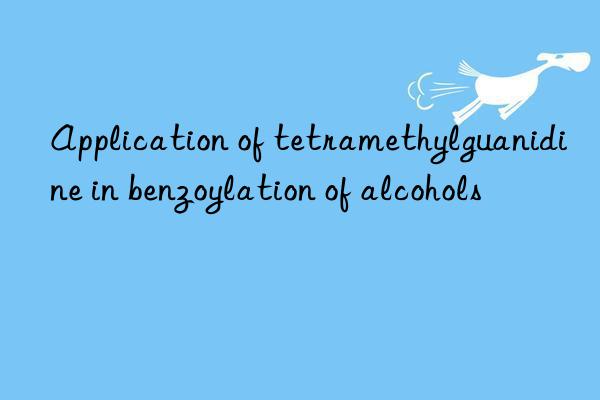
In organic synthesis, benzoylation of alcohols is a key chemical transformation process, mainly used to introduce benzoyl groups as protective groups Or build specific functional units. This reaction plays an important role in the pharmaceutical industry, materials science, and fine chemical manufacturing. Tetramethylguanidine (TMG), as a highly efficient catalyst, has attracted much attention due to its significant advantages in alcohol benzoylation reactions, including increased reaction rate, improved yield and selectivity, and in some cases Substitute more expensive catalysts. This article aims to explore the application of tetramethylguanidine in the benzoylation reaction of alcohols, including its catalytic mechanism, reaction optimization strategy and considerations from the perspective of green chemistry.
Catalytic mechanism of tetramethylguanidine
Tetramethylguanidine serves as a catalyst for the benzoylation reaction of alcohols. Its mechanism of action is mainly reflected in the following aspects:
- Activated benzoyl reagent: Tetramethylguanidine can form a complex with benzoyl chloride or benzoic anhydride, which enhances the electrophilicity of the benzoyl reagent through electronic effects, making it More receptive to nucleophilic attack by alcohols.
- Promote esterification reaction: In the esterification reaction of alcohol and benzoylation reagent, tetramethylguanidine promotes the reaction by stabilizing the transition state and accelerating the formation of ester bonds.
- Suppression of side reactions: The steric hindrance of tetramethylguanidine helps avoid side reactions between alcohol molecules, such as the self-condensation reaction of alcohol, thereby improving the selectivity and selectivity of the target product. purity.
Reaction optimization strategy
In order to achieve the catalytic effect of tetramethylguanidine in the benzoylation reaction of alcohols, the following key reaction parameters need to be optimized:
- Catalyst dosage: The dosage of tetramethylguanidine needs to be adjusted according to the reaction system and the type of product required. Too much or too little may affect catalytic efficiency and product yield.
- Solvent selection: Appropriate solvents can promote the dissolution and mixing of reaction components. Common solvents include methylene chloride, diethyl ether, DMF, etc. When selecting, the effect of the solvent on the reaction rate and product must be taken into consideration Selective effects.
- Temperature control: Reaction temperature has a direct impact on the reaction rate. Too high a temperature may accelerate side reactions, while too low a temperature may reduce the reaction rate, so a balance point needs to be found.
- Reaction time: The length of reaction time affects the yield and purity of the product. Excessive reaction time may lead to product degradation or side reactions.
Green chemistry perspective
While pursuing high-efficiency catalysis, green chemistry principles should also be given full attention, including:
- Catalyst recyclability: Explore the recovery and reuse technology of tetramethylguanidine to reduce chemical waste and improve economic efficiency and environmental protection.
- Use environmentally friendly solvents: Choose less toxic and easily biodegradable solvents, such as water or supercritical carbon dioxide, to reduce environmental pollution.
- Energy consumption and emissions: Use mild reaction conditions, such as microwave heating or photochemical catalysis, to reduce energy consumption and greenhouse gas emissions.
Examples and applications
Examples of the application of tetramethylguanidine in alcohol benzoylation reactions include but are not limited to:
- As a catalyst when synthesizing polyurethane foam, it improves reaction efficiency and product quality.
- Used to prepare nylon (nylon) and other protein-based polymers to increase synthesis speed and yield.
- As a preferred catalyst for alcohol benzoylation reactions in the synthesis of fine chemicals, especially when the reaction requires high selectivity and high yield.
Conclusion
Tetramethylguanidine, as a catalyst for alcohol benzoylation reaction, not only improves the efficiency of the reaction and the selectivity of the product, but also plays an important role in green chemistry. It shows good application prospects under the principle. By continuously optimizing reaction conditions and combining with modern green chemistry concepts, the value of tetramethylguanidine in organic synthesis can be further enhanced and the chemical industry can be driven to develop in a more environmentally friendly, efficient and sustainable direction. Future research will be dedicated to developing more novel catalysts and optimization strategies to meet the growing needs of chemical synthesis and environmental protection challenges.
Extended reading:
T120 1185-81-5 di(dodecylthio) dibutyltin – Amine Catalysts (newtopchem.com)
DABCO 1027/foaming retarder – Amine Catalysts (newtopchem.com)
DBU – Amine Catalysts (newtopchem.com)
bismuth neodecanoate – morpholine
amine catalyst Dabco 8154 – BDMAEE
2-ethylhexanoic-acid-potassium-CAS-3164-85-0-Dabco-K-15.pdf (bdmaee.net)


